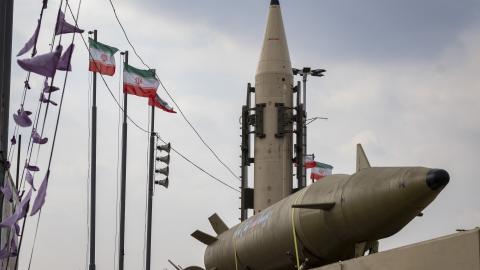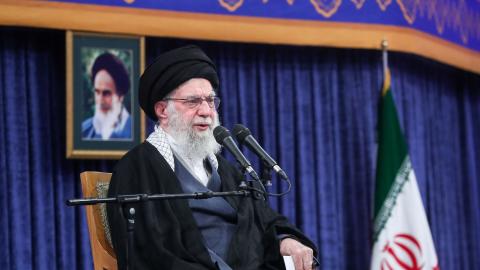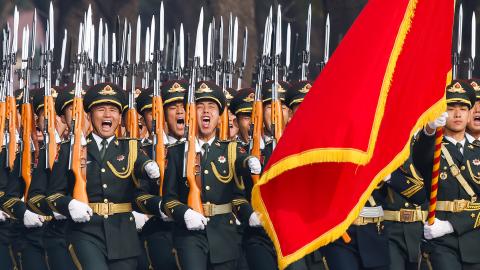Since gaining independence from Britain in 1956, Sudan, Africa's largest country, has been plagued by instability and civil strife. A large part of it has stemmed, especially in recent years, from repeated attempts by the country's military rulers to declare Sudan an Islamic state and to impose strict Islamic law on Muslims and non-Muslims alike. In recent days we in the West have been assaulted, once again, by gruesome new evidence of famine, misery and death in Sudan. But even the best accounts often fail to note that religion -- that is, religious persecution of the most deadly sort -- is at the heart of the current crisis.
In 1989, Lt. Gen. Omar Hassan al-Bashir seized power from Sudan's democratically elected civilian regime. He now rules in partnership with Islamic extremist Hassan al-Turabi and his National Islamic Front. The regime's latest effort to force Islamic law on Christians and animists -- who reside mostly in the south and constitute almost 30% of Sudan's population -- was the direct cause of the recently renewed fighting by southern rebels.
Over the years, the government's persecution has taken many horrifying forms, resulting in the deaths of more than 1.5 million people and the displacement of millions more. Agents of the Sudanese government have bombed, burned and looted southern villages; they have enslaved women and children; they have relocated entire villages into concentration camps called "peace villages" and withheld food from starving Christian and animist communities until they converted to Islam. Individual Christians have been imprisoned, tortured, assassinated and even crucified for their faith. Independent human-rights investigators -- along with the United Nation's Special Rapporteur on Sudan -- have regularly documented this brutal campaign of "forced Islamization."
As bad as all this is, it has recently gotten worse. Early this year, Khartoum decided to escalate its jihad, or holy war, against the non-Muslim south. Since May, relief groups have reported conditions tantamount to genocide as the government has attempted to starve vast numbers of people by compounding drought conditions with the deliberate destruction of farming areas, the confiscation of herds and livestock, and the obstruction of relief efforts.
Earlier this month the relief agency World Vision estimated that government bombing was keeping aid from reaching 2.6 million south Sudanese who are now at risk of dying from hunger. According to the Vatican press in May, 1,000 children were spotted being marched by pro-government troops in a column headed to northern slave markets. In June, the Zurich-based Christian Solidarity International reported that, in one village it visited, troops from the National Islamic Front had shot dead the Episcopalian deacon, vandalized his church, burned hundreds of Bibles and taken away as slaves members of the congregation. Another agency, Christian Solidarity Worldwide of London, called what its members witnessed "genocide." It found "man-made death and destruction on an unprecedented scale."
While each faction in Sudan has violated the laws of war, the Sudanese government's tactics in the south have reached unparalleled levels of barbarity. Episcopalian Bishop Daniel Deng and Catholic Bishop Macram Gassis -- both heads of front-line dioceses in Sudan -- have recently brought that message to the West by offering their testimony in various interviews. Bishop Gassis is bewildered by the world's indifference and stresses that Western leadership is needed to find a "just peace -- one that ends the slaughter and ensures religious freedom for non-Muslims."
But how can this be achieved? In the past two years, a coalition of religious organizations in the U.S. -- mostly Christian, with key Jewish support -- has formed over the issue of anti-Christian persecution abroad. If this coalition is to remain a serious force, it must now take up the challenge of seeking an end to the genocide in Sudan.
Sanctions are not an option, since the U.S. has already broken most of its trade and diplomatic ties with the Sudanese regime over terrorism. Negotiations with the genocidal dictatorship, as some in Congress are now proposing, will not achieve either justice or a lasting peace. At a minimum, what is needed is a U.N. Security Council investigation and, one can hope, some sort of international genocide-tribunal on Sudan. An internationally enforced "no fly zone" -- to stop the government's bombardment of the south -- is also worth pressing for. But nothing will be possible until there is an international outcry, a degree of moral outrage commensurate with the suffering of Sudan's victims, and above all a concerted effort to find a solution. Nowhere in today's world is religious persecution more appalling.


















